leads4pass Latest Update Microsoft AZ-104 Dumps Issues! The latest AZ-104 exam questions help you pass the exam successfully! All questions are updated to ensure true and effective! Welcome to Download leads4pass AZ-104 VCE Dumps or PDF Dumps: https://www.leads4pass.com/az-104.html (Total Questions: 260 Q&A AZ-104 Dumps)
Microsoft AZ-104 Practice testing questions from Youtbe
Dumpinside Exam Table of Contents:
- Latest Microsoft AZ-104 google drive
- Effective Microsoft AZ-104 Practice testing questions
- leads4pass Year-round Discount Code
- What are the advantages of leads4pass?
Latest Microsoft AZ-104 google drive
[FREE PDF] Free Microsoft AZ-104 pdf dumps download from Google Drive: https://drive.google.com/file/d/1j3iTCQIaVNxOsmqRfS_T_okP2YbBnBVs/
Latest updates Microsoft AZ-104 exam practice questions
QUESTION 1
You have an Azure subscription that contains the resources in the following table.

VM1 and VM2 are deployed from the same template and host line-of-business applications accessed by using Remote
Desktop. You configure the network security group (NSG) shown in the exhibit. (Click the Exhibit button.)
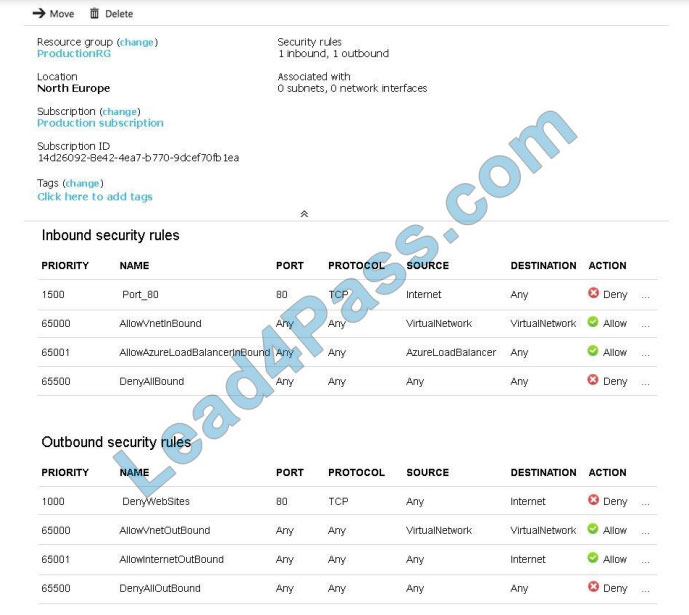
You need to prevent users of VM1 and VM2 from accessing websites on the Internet. What should you do?
A. Associate the NSG to Subnet1.
B. Disassociate the NSG from a network interface.
C. Change the DenyWebSites outbound security rule.
D. Change the Port_80 inbound security rule.
Correct Answer: A
You can associate or dissociate a network security group from a network interface or subnet. The NSG has the
appropriate rule to block users from accessing the Internet. We just need to associate it with Subnet1. References:
https://docs.microsoft.com/en-us/azure/virtual-network/manage-network-security-group
QUESTION 2
You download an Azure Resource Manager template based on an existing virtual machine. The template will be used to
deploy 100 virtual machines. You need to modify the template to reference an administrative password. You must
prevent the password from being stored in plain text.
What should you create to store the password?
A. Azure Active Directory (AD) Identity Protection and an Azure policy
B. a Recovery Services vault and a backup policy
C. an Azure Key Vault and an access policy
D. an Azure Storage account and an access policy
Correct Answer: C
You can use a template that allows you to deploy a simple Windows VM by retrieving the password that is stored in a
Key Vault. Therefore the password is never put in plain text in the template parameter file. References:
https://azure.microsoft.com/en-us/resources/templates/101-vm-secure-password/
QUESTION 3
You need to define a custom domain name for Azure AD to support the planned infrastructure.
Which domain name should you use?
A. Join the client computers in the Miami office to Azure AD.
B. Add http://autologon.microsoftazuread-sso.com to the intranet zone of each client computer in the Miami office.
C. Allow inbound TCP port 8080 to the domain controllers in the Miami office.
D. Install Azure AD Connect on a server in the Miami office and enable Pass-through Authentication
E. Install the Active Directory Federation Services (AD FS) role on a domain controller in the Miami office.
Correct Answer: BD
Every Azure AD directory comes with an initial domain name in the form of domainname.onmicrosoft.com. The initial
domain name cannot be changed or deleted, but you can add your corporate domain name to Azure AD as well. For
example, your organization probably has other domain names used to do business and users who sign in using your
corporate domain name. Adding custom domain names to Azure AD allows you to assign user names in the directory
that are familiar to your users, such as \\’[email protected].\\’ instead of \\’alice@domain name.onmicrosoft.com\\’.
Scenario: Network Infrastructure: Each office has a local data center that contains all the servers for that office. Each
office has a dedicated connection to the Internet. Humongous Insurance has a single-domain Active Directory forest
named humongousinsurance.com Planned Azure AD Infrastructure: The on-premises Active Directory domain will be
synchronized to Azure AD. References: https://docs.microsoft.com/en-us/azure/active-directory/fundamentals/addcustom-domain
QUESTION 4
You need to define a custom domain name for Azure AD to support the planned infrastructure. Which domain name
should you use it?
A. ad.humongousinsurance.com
B. humongousinsurance.onmicrosoft.com
C. humongousinsurance.local
D. humongousinsurance.com
Correct Answer: D
Every Azure AD directory comes with an initial domain name in the form of domainname.onmicrosoft.com. The initial
domain name cannot be changed or deleted, but you can add your corporate domain name to Azure AD as well. For
example, your organization probably has other domain names used to do business and users who sign in using your
corporate domain name. Adding custom domain names to Azure AD allows you to assign user names in the directory
that are familiar to your users, such as \\’[email protected].\\’ instead of \\’alice@domain name.onmicrosoft.com\\’.
Scenario: Network Infrastructure: Each office has a local data center that contains all the servers for that office. Each
office has a dedicated connection to the Internet. Humongous Insurance has a single-domain Active Directory forest
named humongousinsurance.com Planned Azure AD Infrastructure: The on-premises Active Directory domain will be
synchronized to Azure AD. References: https://docs.microsoft.com/en-us/azure/active-directory/fundamentals/addcustom-domain
QUESTION 5
You need to use Azure Automation State Configuration to manage the ongoing consistency of the virtual machine
configurations.
Which five actions should you perform in sequence? To answer, move the appropriate action from the list of actions to
the answer area and arrange them in the correct order. NOTE: More than one order of answer choices is correct. You
will
receive credit for any of the correct orders you select.
Select and Place:
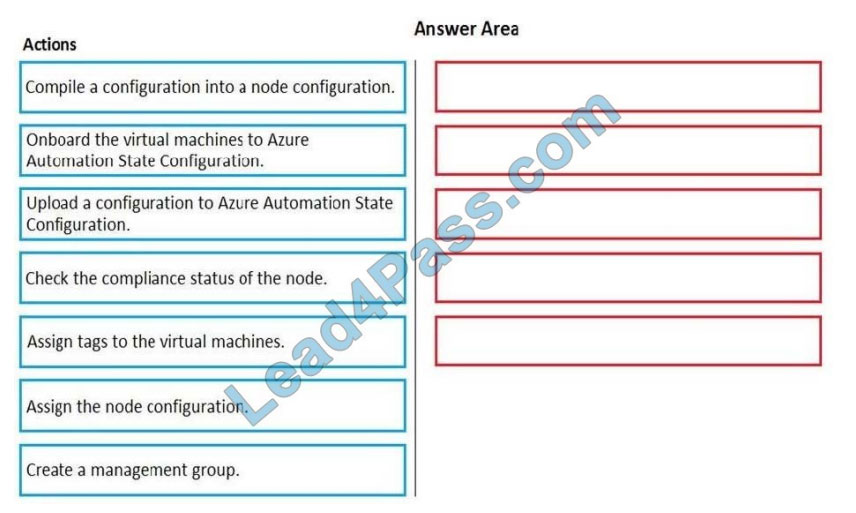
Correct Answer:
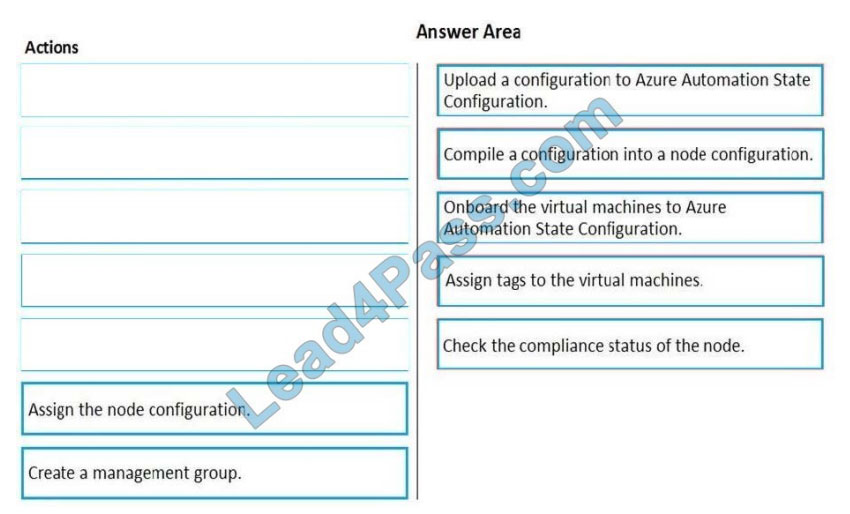
Step 1: Upload a configuration to the Azure Automation State Configuration. Import the configuration into the Automation
account.
Step 2: Compile a configuration into a node configuration. A DSC configuration defining that state must be compiled into
one or more node configurations (MOF document), and placed on the Automation DSC Pull Server.
Step 3: Onboard the virtual machines to Azure Automation State Configuration. Onboard the Azure VM for management
with Azure Automation State Configuration
Step 4: Assign the node configuration
Step 5: Check the compliance status of the node Each time Azure Automation State Configuration performs a
consistency check on a managed node, the node sends a status report back to the pull server. You can view these
reports on the page for that node. On the blade for an individual report, you can see the following status information for
the corresponding consistency check: The report states – whether the node is “Compliant”, the configuration “Failed”, or
the node is “Not Compliant”
References: https://docs.microsoft.com/en-us/azure/automation/automation-dsc-getting-started
QUESTION 6
You have a virtual network named VNet1 that has the configuration shown in the following exhibit.
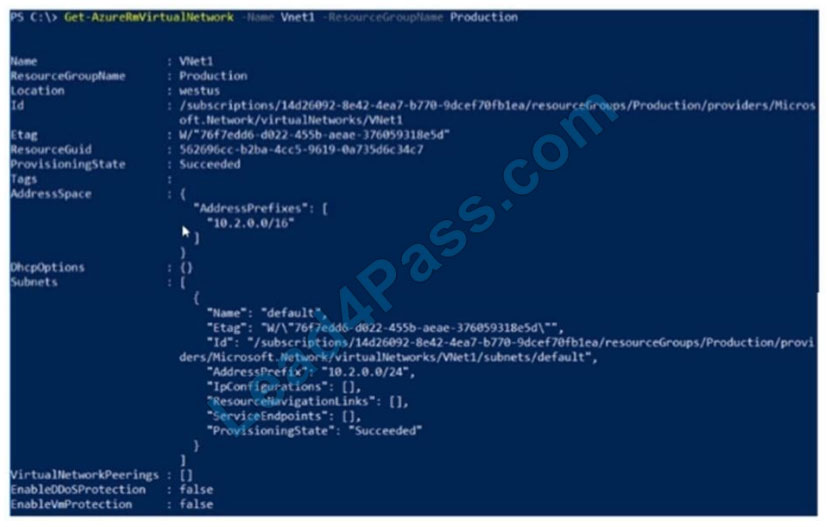
Use the drop-down menus to select the answer choice that completes each statement based on the information
presented in the graphic. NOTE: Each correct selection is worth one point.
Hot Area:
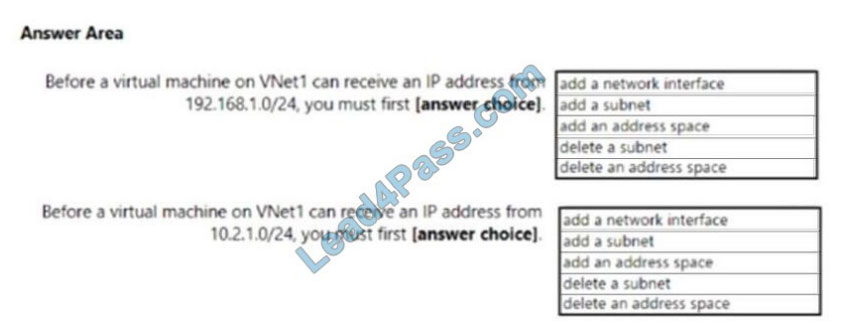
Correct Answer:
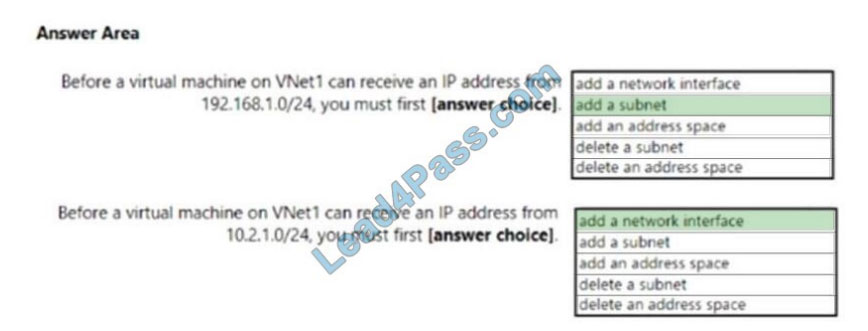
Box 1: add a subnet Your IaaS virtual machines (VMs) and PaaS role instances in a virtual network automatically
receive a private IP address from a range that you specify, based on the subnet they are connected to. We need to add
the 192.168.1.0/24 subnet. Box 2: add a network interface The 10.2.1.0/24 network exists. We need to add a network
interface. References: https://docs.microsoft.com/en-us/azure/virtual-network/virtual-networks-static-private-IP-armpportal
QUESTION 7
Note: This question is part of a series of questions that present the same scenario. Each question in the series contains
a unique solution that might meet the stated goals. Some question sets might have more than one correct solution,
while
others might not have a correct solution. After you answer a question in this section, you will NOT be able to return to it.
As a result, these questions will not appear in the review screen.
You have an Azure subscription that contains the following resources:
* A virtual network that has a subnet named Subnet1
*
Two network security groups (NSGs) named NSG-VM1 and NSG-Subnet1
*
A virtual machine named VM1 that has the required Windows Server configurations to allow Remote Desktop
connections NSG-Subnet1 has the default inbound security rules only. NSG-VM1 has the default inbound security rules
and the following custom inbound security rule:
*
Priority: 100
*
Source: Any
* Source port range: * * Destination: *
*
Destination port range: 3389
*
Protocol: UDP
*
Action: Allow
VM1 connects to Subnet1. NSG1-VM1 is associated with the network interface of VM1. NSG-Subnet1 is associated with
Subnet1.
You need to be able to establish Remote Desktop connections from the internet to VM1. Solution: You add an inbound
security rule to NSG-Subnet1 that allows connections from the Any source to the VirtualNetwork destination for port
range
3389 and uses the TCP protocol. You remove NSG-VM1 from the network interface of VM1.
Does this meet the goal?
A.
Yes
B.
No
Correct Answer: B
The default port for RDP is TCP port 3389. A rule to permit RDP traffic must be created automatically when you create
your VM. Note on NSG-Subnet1: Azure routes network traffic between all subnets in a virtual network, by default.
References:
https://docs.microsoft.com/en-us/azure/virtual-machines/troubleshooting/troubleshoot-rdp-connection
QUESTION 8
You need to the appropriate sizes for the Azure virtual for Server2. What should you do? To answer, select the
appropriate options in the answer area. NOTE: Each correct selection is worth one point.
Hot Area:
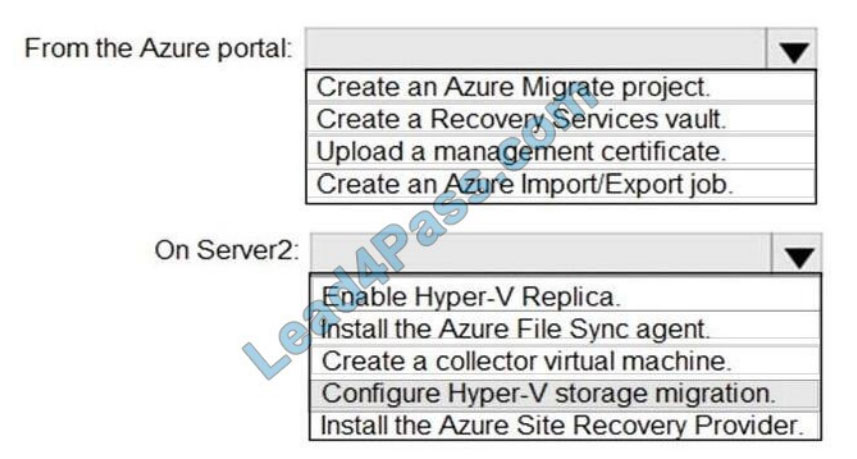
Correct Answer:
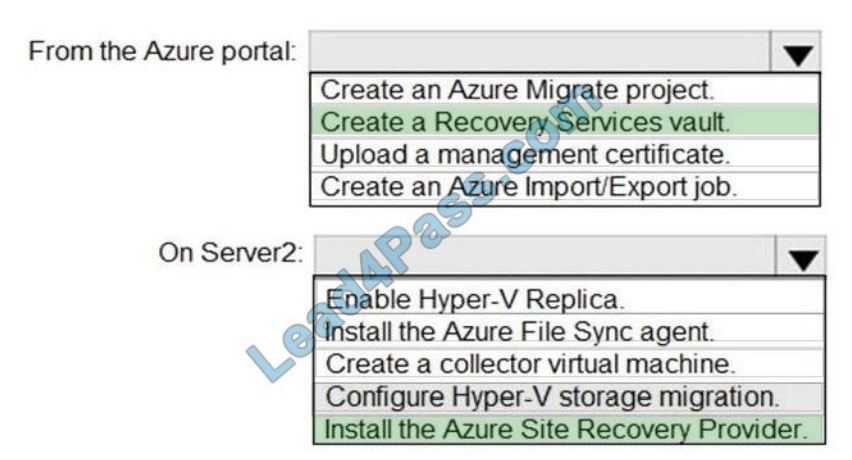
Box 1: Create a Recovery Services vault
Create a Recovery Services vault on the Azure Portal.
Box 2: Install the Azure Site Recovery Provider
Azure Site Recovery can be used to manage the migration of on-premises machines to Azure. Scenario: Migrate the virtual
machines hosted on Server1 and Server2 to Azure.
Server2 has the Hyper-V host role.
References:
https://docs.microsoft.com/en-us/azure/site-recovery/migrate-tutorial-on-premises-azure
QUESTION 9
Note: This question is part of a series of questions that present the same scenario. Each question in the series contains
a unique solution that might meet the stated goals. Some question sets might have more than one correct solution,
while
others might not have a correct solution. After you answer a question in this section, you will NOT be able to return to it.
As a result, these questions will not appear in the review screen.
You have an Azure Active Directory (Azure AD) tenant named Adatum and an Azure subscription named Subscription1.
Adam contains a group named Developers. Subscription1 contains a resource group named Dev.
You need to provide the developer group with the ability to create Azure logic apps in the Dev resource group.
Solution: On Dev, you assign the Logic App Contributor role to the Developers group.
Does this meet the goal?
A. Yes
B. No
Correct Answer: A
The Logic App Contributor role lets you manage the logic app, but not access to them. It provides access to view, edit, and
update a logic app.
References:
https://docs.microsoft.com/en-us/azure/role-based-access-control/built-in-roles https://docs.microsoft.com/enus/azure/logic-apps/logic-apps-securing-a-logic-app
QUESTION 10
You have an Azure subscription that contains the resources shown in the following table.

You need to create a network interface named NIC1. In which location can you create NIC1?
A. East US and North Europe only.
B. East US and West Europe only.
C. East US, West Europe, and North Europe.
D. East US only.
Correct Answer: D
A virtual network is required when you create a NIC. Select the virtual network for the network interface. You can only
assign a network interface to a virtual network that exists in the same subscription and location as the network
interface.
Once a network interface is created, you cannot change the virtual network it is assigned to. The virtual machine you
add the network interface to must also exist in the same location and subscription as the network interface.
References:
https://docs.microsoft.com/en-us/azure/virtual-network/virtual-network-network-interface
QUESTION 11
You create a virtual machine scale set named Scale1. Scale1 is configured as shown in the following exhibit.
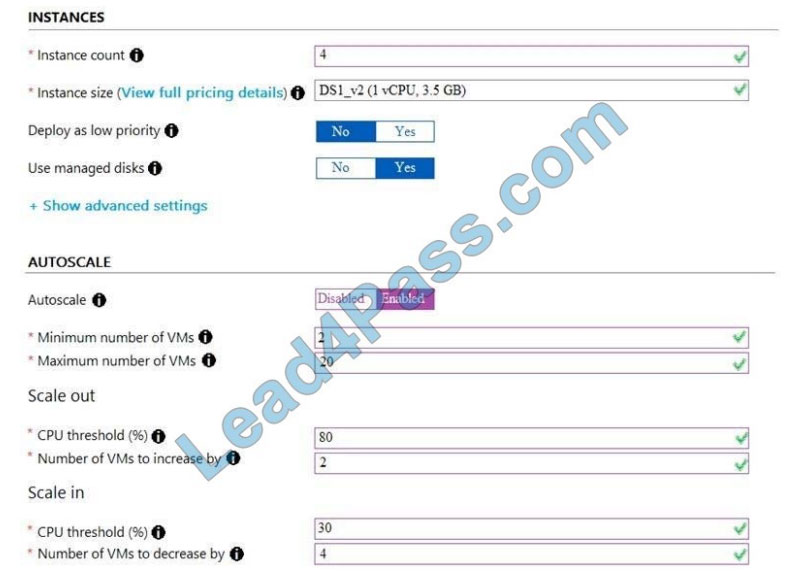
Use the drop-down menus to select the answer choice that completes each statement based on the information
presented in the graphic.
Hot Area:
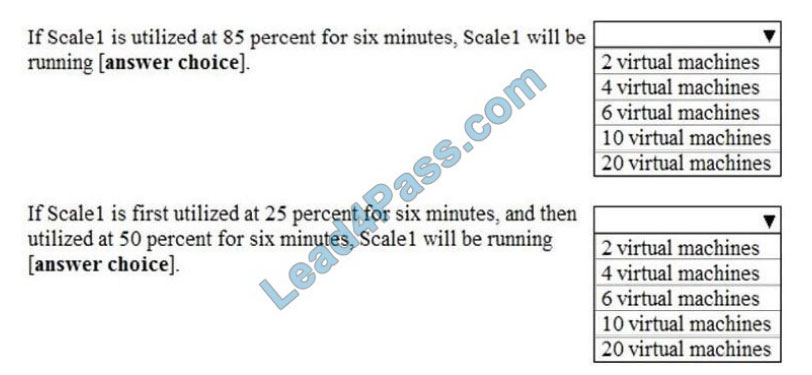
Correct Answer:
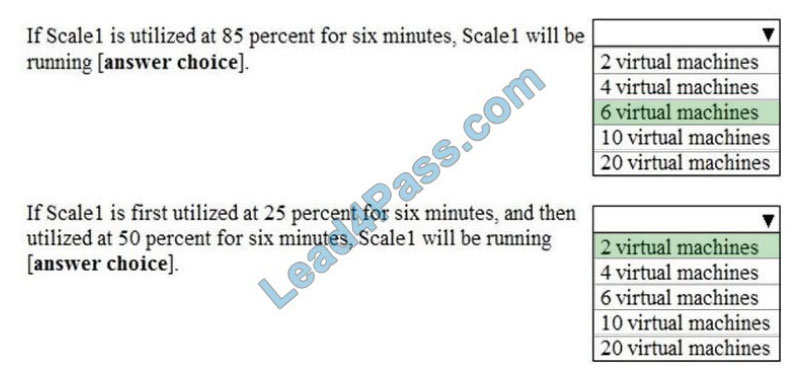
Box 1:
The Autoscale scale-out rule increases the number of VMs by 2 if the CPU threshold is 80% or higher. The initial
instance count is 4 and rises to 6 when the 2 extra instances of VMs are added.
Box 2:
The Autoscale scale in rule decreases the number of VMs by 4 if the CPU threshold is 30% or lower. The initial instance
count is 4 and thus cannot be reduced to 0 as the minimum instances is set to 2. Instances are only added when the
CPU threshold reaches 80%.
References:
https://docs.microsoft.com/en-us/azure/azure-monitor/platform/autoscale-overview https://docs.microsoft.com/enus/azure/azure-monitor/platform/autoscale-best-practices https://docs.microsoft.com/en-us/azure/azuremonitor/platform/autoscale-common-scale-patterns
QUESTION 12
You plan to create an Azure virtual machine named VM1 that will be configured as shown in the following exhibit. The
planned disk configurations for VM1 are shown in the following exhibit.
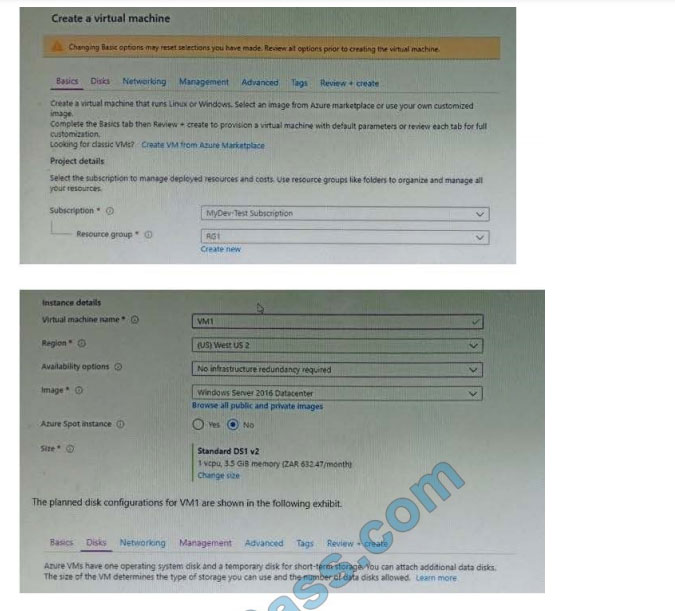
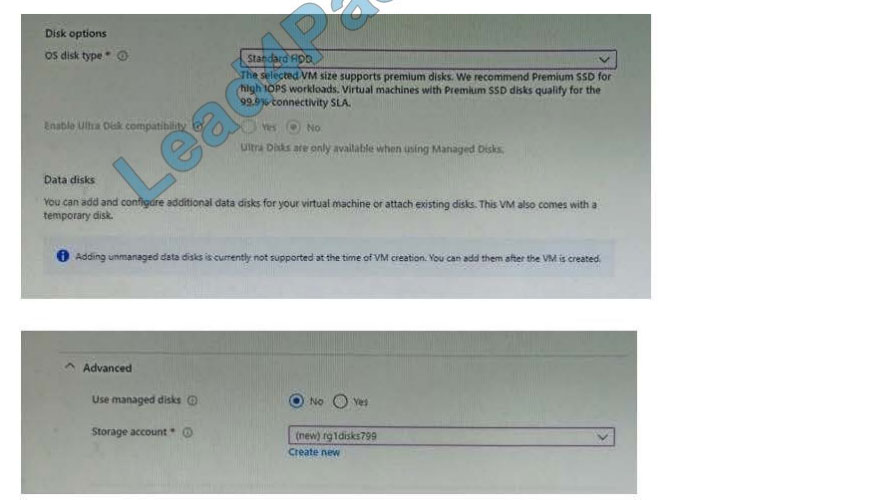
You need to ensure that VM1 can be created in an Availability Zone. Which two settings should you modify? Each
correct answer presents part of the solution. NOTE: Each correct selection is worth one point.
A. Use managed disks
B. Availability options
C. OS disk type
D. Size
E. Image
Correct Answer: AE
QUESTION 13
You have an Azure subscription named Subscription1 that contains the resources shown in the following table.
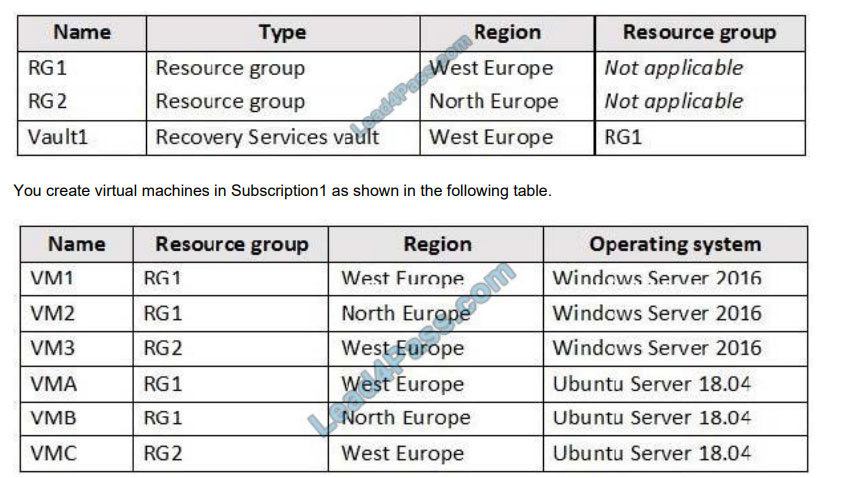
You plan to use Vault1 for the backup of as many virtual machines as possible. Which virtual machines can be backed
up to Vault1?
A. VM1, VM3, VMA, and VMC only
B. VM1 and VM3 only
C. VM1, VM2, VM3, VMA, VMB, and VMC
D. VM1 only E. VM3 and VMC only
Correct Answer: A
To create a vault to protect virtual machines, the vault must be in the same region as the virtual machines. If you have
virtual machines in several regions create a Recovery Services vault in each region.
References:
https://docs.microsoft.com/bs-cyrl-ba/azure/backup/backup-create-rs-vault
Latest leads4pass Microsoft dumps Discount Code 2020

About The leads4pass Dumps Advantage
leads4pass has 7 years of exam experience! A number of professional Microsoft exam experts! Update exam questions throughout the year! The most complete exam questions and answers! The safest buying experience! The greatest free sharing of exam practice questions and answers!
Our goal is to help more people pass the Microsoft exam! Exams are a part of life, but they are important! In the study, you need to sum up the study! Trust leads4pass to help you pass the exam 100%!

Summarize:
This blog shares the latest Microsoft AZ-104 exam dumps, AZ-104 exam questions, and answers! AZ-104 pdf, AZ-104 exam video!
You can also practice the test online! leads4pass is the industry leader!
Select leads4pass AZ-104 exams Pass Microsoft AZ-104 exams “Microsoft Azure Administrator Exam”. Help you successfully pass the AZ-104 exam.
ps.
Get Microsoft Full Series Exam Dump: https://www.fulldumps.com/?s=microsoft (Updated daily)
Get leads4pass Azure Administrator Associate exam dumps: https://www.leads4pass.com/role-based.html
Latest update leads4pass AZ-104 exam dumps: https://www.leads4pass.com/az-104.html (93 Q&As)
[Q1-Q12 PDF] Free Microsoft AZ-104 pdf dumps download from Google Drive: https://drive.google.com/file/d/1j3iTCQIaVNxOsmqRfS_T_okP2YbBnBVs/